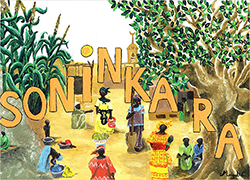
After Gollere in 2004 Tiguéré in 2005 Nabadji in 2006 Yérouma in 2007, Fadiara in 2008, 2009 and Goumal Fora Diawara in 2010, is the city of Waoundé who had the honor of hosting the 2011 edition of cultural Days of Soninkara Jiida association.
This association is no longer present in Senegal , includes among its members more than 42 Soninke villages of Bundu , Futa and Haire .
For this edition Waoundé , activities began on the night of March 25 to 26, 2011 by sunke ( evening ) led by artistic troupes Diawara, Toulel and Waoundé .
Early morning ( day of March 26, 2011 ) , it is in a great atmosphere of excitement that official delegations were received . It was among the distinguished guests , the governor of the region of Matam, the prefect of Kanel or their accompanied officials from all business sectors representatives (breeding , health, etc. . ) , Representatives of the 42 villages that make up Soninkara Jiida and the leaders of the association.
Around 9 am , the public came from all four cardinal points has taken the enclosure assault the mayor and CMC ( Community Multimedia Centre ) which hosts the festivities.
Like to welcome all officials of the Senegalese government and to mark the importance of the event, primary school students and college Waoundé sang in chorus , the Senegalese national anthem in Soninke language. It was a solemn moment when the entire audience rose as one man with respect to the national symbol.
Then came the opening statements where the governor, sponsoring cultural days Mr. Samba Diarra Camara, village leaders , representatives of youth and women took turns turns to magnify the importance of these days and to thank the " Soninkara Jiida " association focused on Waoundé choice for this 2011 edition.
Then came the long awaited moment by the audience , namely the parade horses. The riders , wearing outfits warriors whose pants ended in leather boots that came up to their knees , deftly wielded the reins and stirrups of their thoroughbred , making them perform, from time to time , synchronized dance steps .
After the horses, the art troupe of Waoundé took over with various demonstrations, followed by troop Toulel . The audience was held spellbound for hours . He was entitled to the well synchronized choreography where all the tunes and dance rhythms of the local Soninke were revisited , and a parade of traditional outfits and hairstyles ( yiraamu guarantee ) .
The next day ( day 27 March 2011 ) in the early morning , it was the turn of former deans and show their skills in dancing Janba ( Janba lege ) . They brought for the occasion the great drum village Waoundé ( Tabalé or Dan Xoore ) . This large drum , aged by time ( in fact , termites gnawed one foot ) was formerly used at the time when phones , radios and other modern means of communication did not exist in the village. We beat the big drum to communicate information to the public or to announce news to neighboring villages ( deaths, marriages , meetings, etc. . ) .
Deans gave way to artisans ( weavers and blacksmiths ) who expounded tools and other artifacts by their own care for the opportunity to demonstrate their ancestral know-how.
In the afternoon it was the turn of Taalibo which launched a contest taaliba ndopa . Singers and flute players ( buutu ) and public synchronized applause grew dancers perform jumps increasingly perilous and spectacular .
But it is the Somono and Soubalo , who did not want to be outdone, that ravished the limelight Taalibo . Somono and Soubalo are two minority ethnic groups Waoundé whose main activity is fishing and living alongside Soninke . Somono speak Bambara and Soubalo , Pular . All their demonstrations had a relationship with the river and the water , the element they control .
Soninke in cultural heritage, traditional marriage rite prominently . Therefore , a cultural day worthy of the name can not omit this other facet of the Soninke culture. Thus , the organizers did not forget to book a great place for that part in the program. A large staging of accompanying the bride ( Maano leeginde ) was organized , along with wedding songs for hours .
Cultural days Soninkara Jiida to Waoundé were closed by a big concert with the participation of all the " rappers " of Soninke Waoundé and surroundings.
In the words of the organizers and leaders of Soninkara Jiida , the 2011 edition of Waoundé appear long in the annals of the association, because, according to them, which was done Waoundé had never been done elsewhere before in all previous editions.
Fodyé Cissé .
Source: http://www.waounde.com



